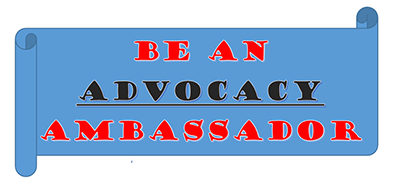Advocates in the Making
April 16, 2021

|
While on the path to adulthood, all young people need to learn to advocate for themselves. In other words, they need to find their voices. For young people with disabilities, learning to advocate for themselves is crucial in becoming more independent and reaching their life goals. The Institute for Disability Studies (IDS) Transition to Adulthood Programs have recognized the need to have advocacy at the core of all curriculum and services.
In fall 2020 during the COVID-19 pandemic, the Transition of Teens to Adult Life (ToTAL) Program added a new training initiative, Advocacy Ambassador Program, that focused exclusively on assisting youth and young adults with disabilities to be advocates and find their voice. The first Advocacy Ambassador cohort consisting of six participants, five high school students and one college student, began their advocacy journey by participating in weekly zoom meetings and completing weekly remote learning activities all focused on advocacy development in addition to their existing educational commitments. By the end of the three-month training series, all six young people learned the value of telling one's story and had the opportunity to be a featured speaker at a virtual youth advocacy summit.
In February 2021, the second cohort of Advocacy Ambassadors began with ten participants and four peer mentors from the first cohort. In addition to the weekly zoom meetings and remote learning activities, these ten new participants are receiving peer mentorship services. The new weekly peer mentoring allows one-on-one and small group interaction and focuses on further developing advocacy skills for both the peer mentor and mentee. A second advocacy summit is planned for April 2021 to provide an opportunity for these ten young people to share their stories and be featured presenters at a youth advocacy summit.
As noted by Danielle Parks, IDS Transition Specialist and featured Ambassador Trainer, "Young people with disabilities sometimes do not realize that they have a voice of their own that needs to be heard. The Advocacy Ambassador Program is needed in order to give these participants the confidence to advocate for themselves during this time in their lives. What has been most rewarding for me as a trainer is seeing the four peer mentors, who were program participants in fall 2020, take what they learned during their time in the program and impact the new participants through their activities and discussions. This shows that the knowledge and skills learned during this program can make a lasting impact on these individuals."
For over 40 years, IDS has maintained its mission to "positively affect the lives of Mississippi citizens with developmental and other disabilities and their families across the lifespan and to work toward increasing their independence, productivity, and community inclusion." IDS has four emphasis areas for its programs and services: Early Childhood Inclusion and Education, Housing, Transition to Adulthood, and Wellness.
The IDS transition to adulthood programs promote full community inclusion, productivity and independence for youth and young adults with and without disabilities. Transition foci include the following four areas: (1) EMPLOYMENT - Focuses on preparing youth and young adults for meaningful, competitive integrated employment in the community; (2) LEADERSHIP/ADVOCACY - Focuses on preparing future leaders who can advocate for themselves and for others; (3) SERVICE/VOLUNTEERISM - Focuses on providing opportunities for national service volunteerism to address critical community needs and for professional development training; (4) POSTSECONDARY EDUCATION - Focuses on supporting students with disabilities through inclusive education opportunities; and additional transition areas provided as needed and identified.
The ToTAL Program is funded through the Mississippi Department of Rehabilitation Services as part of its pre-employment transition services (Pre-ETS). To learn more about the ToTAL Program, the Advocacy Ambassador Training Series or any of the IDS Transition to Adulthood Programs, visit www.usm.edu/ids, call 601.266.5163 or email [email protected].







